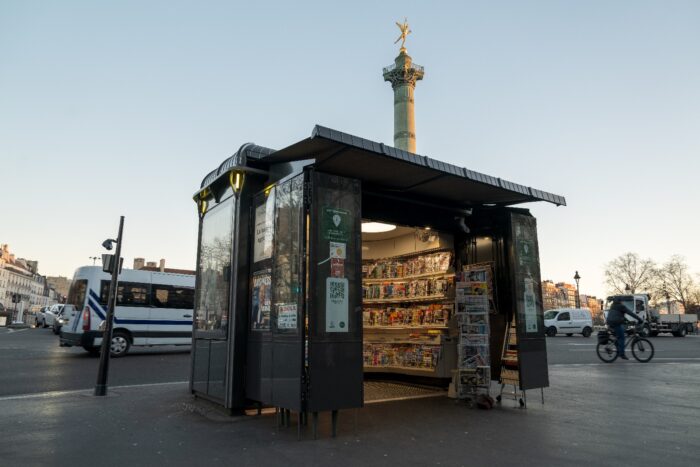In the U.S., when a publisher signs a licensing deal with an AI company, newsroom staffers don’t get a cut.
Many newsrooms have licensed their content to OpenAI in bulk, for example. A staff reporter’s stories can be used as training data for the latest GPT model, or may surface in ChatGPT’s response to a user question.
Does that reporter deserve to be compensated directly for how their work is being used by OpenAI? In France, the answer is, increasingly, yes.
At least, that’s the logic underlying a host of agreements between French news publishers and trade unions, which are redistributing revenue from AI licensing deals directly to journalists. These agreements guarantee that if a reporter’s stories are being used by AI companies, they will share directly in the publisher’s earnings.
 In some cases, the agreements put a fixed sum of several hundred euros into the pockets of newsroom staffers each year. At other outlets, journalists are splitting a percentage share. Le Monde, one of France’s largest newspapers, signed a deal with several unions in June 2024 ensuring a quarter of its AI licensing revenue is redistributed, without a ceiling.
In some cases, the agreements put a fixed sum of several hundred euros into the pockets of newsroom staffers each year. At other outlets, journalists are splitting a percentage share. Le Monde, one of France’s largest newspapers, signed a deal with several unions in June 2024 ensuring a quarter of its AI licensing revenue is redistributed, without a ceiling.
To an American journalist, these arrangements can feel foreign or out of reach. The dynamics on the ground in the U.S. are strikingly different from those in France; American newsrooms operate under a different intellectual property framework and with far fewer economic protections for unions. Most newsroom unions in the U.S. have never seen the terms of their employers’ AI licensing deals, let alone successfully negotiated for a share.
I spoke to news industry leaders in France to better understand how these agreements with publishers came to fruition, and if these deals could ever cross the Atlantic.
Not copyright — neighboring rights
Licensing deals between French news publishers and AI companies usually fall under a body of law called “neighboring rights.” Neighboring rights — or droits voisins, in French — are intellectual property rights distinct from copyright, though their definitions can be, at times, slippery. In the past, the concept of neighboring rights was used in France to ensure fair compensation for music record producers and radio and television broadcasters.
In 2019, the term took on a new meaning for news publishers, as a legal justification to demand compensation from search engines and social media platforms. That year, the European Union passed a directive with the goal of maintaining a “well-functioning marketplace for copyright” in the digital era. In part, the directive encouraged member nations to ensure news publishers had control over how snippets of their articles and other journalistic content were being used by big tech companies like Google and Facebook.
“The idea of the European Union was to rebalance negotiations,” said Pierre Petillault, director of Alliance de la Presse d’Information Générale (APIG), France’s largest association for national and regional newspapers. “We lost half of our revenue over the past 20 years — €3 billion that went out of the industry — and we’re just managing to get some crumbs back. That’s what neighboring rights are about.”
France was the first EU member nation to respond to the directive. Within a few months, legislators amended the country’s IP law and codified neighboring rights for news publishers. The law broadly entitled publishers to compensation from digital platforms, especially if the platforms earned advertising revenue from their content.
Tech companies resisted the law. In 2021, a French regulator fined Google €500 million for failing to bargain in “good faith” over neighboring rights. With time, though, major deals were successfully negotiated. APIG signed a neighboring rights deal with Google in 2021 and successfully renegotiated it earlier this year. The deal was made on behalf of more than 100 news publishers in France (not including Le Monde, which opted to negotiate on its own).
 As these deals were solidified, one subsection of the 2019 French IP amendment became increasingly important. The law states that professional journalists whose work is published by news outlets are entitled to an “appropriate and fair” share of the revenue earned from neighboring rights deals. The law also says journalists should receive “complete information” on how their share is calculated at least once a year. The French law stops short of specifying how much money journalists should receive, leaving it to publishers to hash out the specifics themselves with unions.
As these deals were solidified, one subsection of the 2019 French IP amendment became increasingly important. The law states that professional journalists whose work is published by news outlets are entitled to an “appropriate and fair” share of the revenue earned from neighboring rights deals. The law also says journalists should receive “complete information” on how their share is calculated at least once a year. The French law stops short of specifying how much money journalists should receive, leaving it to publishers to hash out the specifics themselves with unions.
Journalism organizations lobbied hard to include the redistribution language in the 2019 law, Petillault said.
“It’s not author’s rights, it’s not salary,” he told me. “It’s something new — something else.”
Le Monde’s new norm
In 2022, the wire service Agence France-Presse (AFP) became the first major news publisher to sign a neighboring rights revenue redistribution agreement with its journalists. The deal with the three largest unions in its newsroom guaranteed that every journalist represented would receive a fixed payment of €275 per year. These payments were to be made on top of the salaries of newsroom employees.
The initial batch of agreements with unions, including AFP’s, only covered revenue earned from deals with social media platforms and search engines. But as AI licensing deals began cropping up in France in 2024 — starting with one between Le Monde and OpenAI — some unions argued they should be held to the same standards.
In June 2024, Le Monde signed a revenue redistribution agreement with three major unions that covered its AI licensing deals with OpenAI, as well as more general licensing deals dating back to 2019 with Facebook, Google, and Microsoft. The agreement redistributes 25% of the revenue Le Monde earns from these deals to its unionized journalists, with no cap. (The remainder of the earnings is invested into the newspaper’s operations.)
The agreement followed more than two years of negotiations, and the unions said it took more than a year to convince Le Monde to consider a percentage share. The publisher initially offered fixed payments or a share with a capped sum.
Le Monde did not respond to my request for comment. Earlier this summer, though, Le Monde Group CEO Louis Dreyfus and Le Monde editorial director Jérôme Fenoglio publicly touted the 25% figure as precedent-setting in the industry. They called it “a proportion now adopted by several other media groups, far exceeding what others had tried to impose.” They also confirmed that the deal Le Monde signed with Perplexity AI last May will be subject to the same 25% redistribution terms with Le Monde journalists.
“The first publisher who signs a deal gives what we call jurisprudence,” said Emmanuel Parody, an independent media consultant and former secretary general of the Droits Voisins de la Presse (DVP), an industry association for neighboring rights. “The second publishers will have to have a very good reason to not pay the same level.”
Parody says Le Monde set a new norm in the French news industry. “I know that most of the publishers wanted to pay no more than 10% or 15%,” he said. “Now, the reality of the market is, the deals are between 20% to 30%.”
Percentages alone don’t dictate how much money will end up in journalists’ bank accounts, though. In some cases, neighboring rights deals with platforms totaled millions of euros, but those agreements included back pay for up to four years. Renegotiations on similar terms might only turn over a couple hundred thousand euros, according to Parody, though specific figures have not been made public.
At times, the base number used to calculate redistribution has also excluded revenue from Google News Showcase or Facebook News, cutting the share even further. “I think 25% is going to be the average number [moving forward], but every deal is different, so we never know what you have inside the 25%,” he said.
 Some fear that revenue journalists receive via neighboring rights could be withheld from their future salaries. “We are in a situation where our industry is in trouble, so the more you pay it’s easier to say we are not going to change salaries during the next two years,” said Parody, adding that newsroom leaders could use higher redistribution percentages as an excuse to cut employee pay elsewhere.
Some fear that revenue journalists receive via neighboring rights could be withheld from their future salaries. “We are in a situation where our industry is in trouble, so the more you pay it’s easier to say we are not going to change salaries during the next two years,” said Parody, adding that newsroom leaders could use higher redistribution percentages as an excuse to cut employee pay elsewhere.
“For publishers, it’s like journalists are paid three times for the same job,” said Petillault, who confirmed that several publishers within APIG have negotiated and signed agreements. Petillault likens the deals to journalists asking for a cut of advertising or direct sales revenue: “It’s only my individual opinion, but I think the fair share of neighboring rights for journalists is zero.”
This criticism may sound familiar to those in the United States, where similar rhetoric has been used to shut down negotiations altogether. But in France, no matter what publishers say, some form of neighboring rights redistribution is legally mandated.
Why not the U.S.?
Since 2023, AI has been on the bargaining table for unions across the U.S. Currently, 43 contracts negotiated by units of the NewsGuild-CWA, the largest union for journalists in the U.S., include language that references AI adoption in some form. This includes protections fromjob displacement and salary reductions due to AI, as well as terms that require AI-generated content to be labeled and ethical AI adoption committees to be formed.
None of those contracts include language about sharing revenue from AI licensing deals with journalists. “We have raised revenue distribution at multiple bargaining tables. However, companies refuse to provide basic details about the revenue deals they’re striking,” said Jon Schleuss, president of the NewsGuild-CWA.
Newsroom union contracts in the U.S. have some precedent for revenue sharing on intellectual property grounds. The Atlantic’s collective bargaining agreement, for instance, states that when a work is optioned for a movie, TV show, scripted podcast, or theatrical performance, the author is guaranteed 50% of net compensation for the option fee and 33% for the rights fees. If more than one author is involved in producing the work, those payments can be pooled.
To date, though, terms like this have not extended to licensing deals with digital platforms. U.S. labor law doesn’t require or incentivize these kinds of negotiations.
The NewsGuild has attempted to lobby for some regulations on licensing deals with platforms at the federal and state level. The Journalism Competition and Preservation Act, introduced to the Senate in 2023, would allow news publishers to collectively bargain with big tech platforms. The NewsGuild supports a version of the bill that would require 70% of revenue from licensing deals to “be spent on journalists.” In this case, the money wouldn’t go directly into journalists’ pockets, but instead be used to fund newsroom jobs and minimize further layoffs in the industry.
On the state level, similar proposals for 70% of licensing revenue to be invested in newsroom jobs have appeared in proposed bills in California and Oregon. So far, none of these laws have passed.
 Many U.S. unions never even see the terms of licensing deals between AI companies and their employers. For instance, last year Business Insider’s union sent a letter to management demanding to read a copy of its parent company’s contract with OpenAI. The letter echoed similar calls for transparency from The Atlantic Union and New York Magazine Union. Back in June, Insider union vice chair Morgan McFall-Johnson confirmed to me that, nearly a year after sending their letter, the union had still not been able to review any terms of the OpenAI deal.
Many U.S. unions never even see the terms of licensing deals between AI companies and their employers. For instance, last year Business Insider’s union sent a letter to management demanding to read a copy of its parent company’s contract with OpenAI. The letter echoed similar calls for transparency from The Atlantic Union and New York Magazine Union. Back in June, Insider union vice chair Morgan McFall-Johnson confirmed to me that, nearly a year after sending their letter, the union had still not been able to review any terms of the OpenAI deal.
Without details on how much revenue AI deals generate for news organizations, it’s challenging to even begin discussions in the U.S. about agreements like Le Monde’s. “All of the employers with licensing deals have refused to be transparent about the deals, including The New York Times, Wall Street Journal, Axel Springer, Vox, Financial Times, The Atlantic, and the Associated Press,” Schleuss told me.
Still, the NewsGuild says it will continue to advocate for journalists to see a share of revenue from AI deals. Recently, two major news publishers — The New York Times and Time — inked deals with AI companies while under contract with NewsGuild bargaining units. “Journalists will be arguing aggressively for a share of that revenue when those agreements come up for negotiation soon,” he said.
Photo of Paris newsstand by Valerii from Adobe Stock

